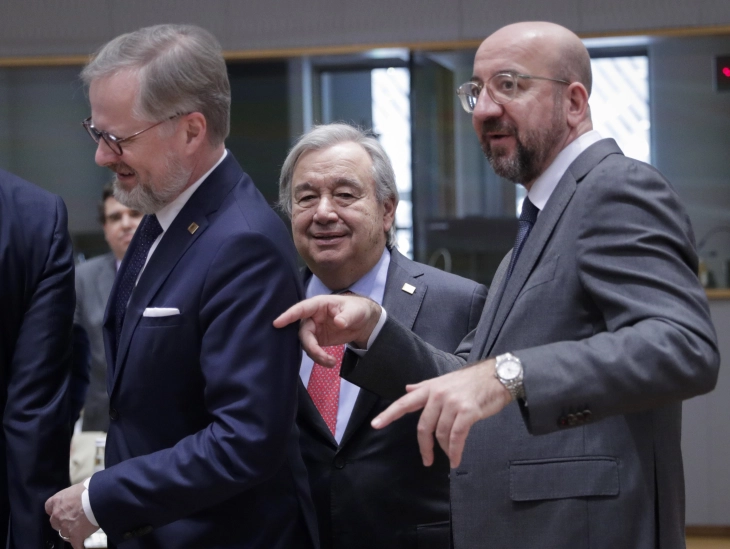EU leaders reaffirm Ukraine support, vow to raise pressure on Russia
- EU leaders reaffirmed their support for Ukraine and opened the door to new sanctions in a pledge to step up pressure on Russia at a summit in Brussels on Thursday.
- Post By Ivan Kolekevski
- 21:42, 23 March, 2023

Brussels, 23 March 2023 (dpa/MIA) – EU leaders reaffirmed their support for Ukraine and opened the door to new sanctions in a pledge to step up pressure on Russia at a summit in Brussels on Thursday.
With "further restrictive measures" and more work to continue on a price cap on Russian oil, the European Union is ready to increase the pain on Russia for its invasion of Ukraine, a joint statement said.
Fitting out the EU’s economy to ensure long-term competitiveness and climate protection was the intended focus for leaders. But their talks also veered both into wider affairs and more national concerns.
Poland, Lithuania and Estonia wanted to start work on lowering the Russian oil price cap to squeeze Russian revenues further. Estonian Prime Minister Kaja Kallas pushed for a review on her arrival.
“We had an agreement in December that the oil price gap will be tied with the market price and will be 5% lower.
"We agreed that we will have a review in January, then in March, but we don't have that review yet,” Kallas said.
EU leaders agreed to crack down on sanctions evasion, resolving to work closer together to enforce punitive measures and prevent circumvention in non-EU countries.
A deal to supply Ukraine with 1 million rounds of artillery ammunition in the next 12 months, and missiles if requested, was also welcomed.
Estonia set the artillery plan in motion over a month ago and Kallas praised the quick work to reach an agreement.
"What is critical is sending ammunition to Ukraine fast, because that might bring a change in this war," she said.
EU leaders also considered Chinese President Xi Jinping's recent visit to Moscow.
Latvian Prime Minister Krisjanis Karins said the trip was “a little bit of an eye opener” for people in the EU that hoped Beijing would be peace broker.
China is “moving right now overtly” to Russia’s side, he said.
Troubled by inflation, expensive energy, repeated supply chain shocks, labour shortages and investment shortfalls - there was plenty for EU leaders to fret over.
How does the EU reduce carbon emissions to zero while securing “its chances as a successful economic area?” German Chancellor Olaf Scholz said on arrival in an attempt to stick to the main agenda.
Like some other leaders, Scholz however let domestic priorities intervene and had to defend Germany’s last-minute objections to an all but settled EU plan that would only allow emission-free new cars after 2035.
There is "a clear understanding" that the European Commission is to propose rules to allow new passenger cars with combustion engines running on so-called e-fuels to be registered after 2035, Scholz said. "That is already the consensus," he added.
Italian Prime Minister Giorgia Meloni criticized the commission for selecting sectors to restrict like vehicles to reduce carbon emissions as this impacts EU member states' economic competitiveness.
Meloni also pushed for greater focus on migration, a minor discussion point on Thursday but a political priority for Rome given the huge name of arrivals in boats travelling across the Mediterranean.
Proposals to allow more state-aid subsidies as the EU competes with other major economies in the transition towards a low-carbon economy were also up for discussion.
Kallas warned against distorting the bloc’s single market area, usually subject to tight regulations, with major state intervention.
“We shouldn't throw the single market out of the window because of different subsidies that different regions are doing,” she said.
France was expected to push for the nuclear sector to be recognized as a cornerstone in the transition, according to EU diplomats.
Luxembourg Prime Minister Xavier Bettel was quick to shoot this down however.
Nuclear energy “is not safe, it is not fast, and it is not cheap and it is also not climate-friendly,” the leader of France’s smallest neighbour and fierce nuclear opponent said.
EU leaders also hosted United Nations Secretary General António Guterres to discuss global development challenges.
Guterres told EU leaders about “a perfect storm” happening in poorer countries, highlighting rising levels of hunger and poverty and the need for more investment.
The UN Chief also warned EU leaders in his opinion that isolating Beijing brings its own risks, referencing ongoing debates in the EU about policies to distance the bloc economically from China.







